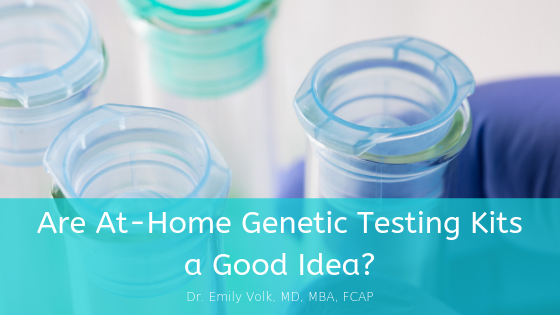In recent years, home genetic testing kits have been growing in popularity, sometimes being bought as holiday presents or birthday gifts. For just a few hundred dollars, individuals have the option to spit into a tube, mail it back to the company in a conveniently prepaid envelope, and in just a few short weeks will have access to a plethora of personal information about themselves that they may not have ever known.
Not only do these testing kits give the consumer an inside look at their family tree, providing a genetic breakdown of where they descend from, but now they also offer the capability to predict if they are more or less prone to certain diseases. The question that consumers and physicians face is whether these tests are a good idea to try.
Pros
It’s Good to Be Health Curious
Taking a home genetic test may be the first step for some to becoming health curious. These tests can be a great start to encourage users to take a good look at their current state of health. If the test results come back to show a higher risk of a disease, it could be the push individuals need to schedule a routine talk with their physician.
It Is Relatively Cheap and Quick
Where professional screenings can cost upwards of thousands of dollars, at-home genetic testing kits typically cost around $150-$200. Some recent versions of these test kits include testing for over 10 commonly genetic conditions. Several companies offer online access to test results within just a few weeks after mailing in a saliva sample.
No Prescription or Health Insurance is Necessary
Home genetic test kits are FDA approved and do not require any authorization from a physician. They also do not require that the consumer have health insurance, just the ability to purchase the online kit.
It Can Connect You to Family
Some companies partner with other companies focused on genealogy services to link genetic information with more traditional methods of mapping the family tree. For those wanting more knowledge of their family history and their living extended family, this gives a great overview of what countries and regions of the world folks descended from. The information shared on their database also helps consumers to connect to other people with similar ancestry who may be related to you. Whether or not to share this information with others is a choice the consumer must make when signing up for these services.
Cons
DNA is Not Everything
DNA testing may provide insight as to whether or not a person has an increased risk for a specific disease, in most cases the presence or absence of a particular gene or set of genes is not the only risk factor for future illness. Most diseases with genetic propensity are highly influenced by a person’s environment and personal habits. So, even if you carry a gene(s) linked to a higher risk of a disease that does not mean that you will get the disease – and vice versa. The information provided by a testing kit is just one piece of the whole body of health information that folks use with their physician to determine the next steps in prevention or treatment. I recommend that all results found through these tests be shared with a physician to help the user put these results into clinical context.
Home testing kits will only test one level of your genes. Professionally administered tests have the ability to test many different variants of multiple genes, giving you a more accurate depiction of your likelihood to carry a disease.
HIPAA May Not Apply
When receiving a test from a doctor or health care professional, your results are kept confidential and protected by the Health Insurance Portability and Accountability Act (HIPAA). This protects any test results or personal information from being shared. At-home genetic tests are not required to follow these guidelines as they are not doctors administered. Most will have their own privacy policy that should be reviewed carefully before purchasing.
The Bottom Line
Ultimately, at-home genetic testing kits are an easy way to learn more about your ancestry and health without having to make an appointment with a physician. With social media promoting a healthy lifestyle in society today, these tests are a great place to start educating yourself on your own health. Just remember that at the end of the day, your physician is more knowledgeable than a home testing kit and to always keep them in the loop with your health questions and share all health information with your physician, including the information you get from a home testing kit.
